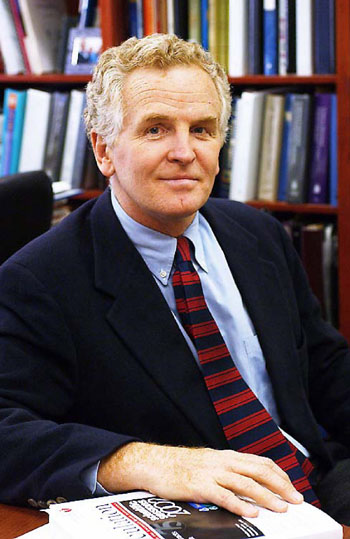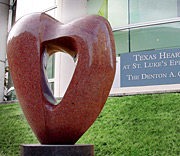In Memoriam: Dr. S. Ward Casscells
"Heart to Heart," October 16, 2012 from Dr. James T. Willerson
Dear Friend of the Texas Heart Institute,
 |
Dr. S. Ward "Trip" Casscells
|
It
is with a heavy heart that I report the passing of
Dr. S. Ward Casscells, a
senior scholar and former associate director for cardiology research at the
Texas Heart Institute.
Known
as "Trip" to his many friends, Dr. Casscells was a close friend, an admired
colleague, a brilliant and caring physician-scientist, and an American patriot
who dedicated his life to serving others. Our most sincere sympathies go to his
wife Roxanne, and their three children.
President
George W. Bush appointed Dr. Casscells in 2007 as Assistant Secretary of Defense
for Health Affairs, a post which he tackled over the next two years with his
usual zeal, overseeing all Department of Defense (DoD) resources and advising
the Defense Secretary on health policy.
He was
widely credited with turning around DoD's struggling health and education
system, which included 137,000 employees and 10 million patients in 900 clinics
and hospitals in 100 countries. When he left, the system was ranked No. 1 in
surveys of patient satisfaction. For this work, he was awarded the DoD's highest
civilian award, the Distinguished Public Service Medal; the Surgeon General's
Medallion from the Department of Health and Human Services; the Army's
Decoration for Distinguished Civilian Service; and the Order of Military
Medical Merit.
Dr.
Casscells, who also was a U.S. Army Reserve Medical Corps colonel, served a
three-month tour of duty in Iraq in 2006. There, he served as liaison to the
U.S. ambassador to Iraq and the Iraqi health minister to create a protocol for
health policy and medical administration in the region. While serving in Iraq,
Dr. Casscells received the Joint Service Commendation Medal.
Dr.
Casscells was deployed to both the Middle East and Asia to study the avian flu
and assess the possibility of a worldwide pandemic. As a result of his work as
the U.S. Army Medical Command's senior medical advisor for avian influenza and
pandemic influenza, Dr. Casscells was awarded the U.S. Army's Meritorious
Service Medal.
His book, When It Mattered Most, a tribute to
medics killed in Iraq and Afghanistan, was termed by Newsweek's Evan Thomas, "a noble work."
Several
years ago, in civilian life, he led an important research study into influenza after
he saw a connection between heart attacks and recent bouts of flu or colds in
his cardiac patients. That study proved a positive correlation between the flu
vaccine and prevention of heart attacks, and is the basis of public advisories
THI still issues each year to heart patients.
Dr.
Casscells served as chief of cardiology and vice president for biotechnology at
The University of Texas Health Science Center at Houston. He was also the John
Edward Tyson Distinguished Professor of Medicine and a professor of cardiology
at The University of Texas Medical School at Houston.
He also
collaborated with me and others at THI in the discovery of the role of
vulnerable plaques in arteries that can lead to heart attacks and strokes. Out
of that research came new catheters that are now used worldwide to help detect
those plaques by measuring temperatures within arteries. Dr. Casscells and I
were co-founders of the highly successful Volcano Corporation, which produces
those catheters and other medical devices.
His work in
mobile telemedicine and disaster response earned him the General Maxwell R. Thurman Award, the Department of
Health and Human Service's Best Public Health Practice Award, as well as the
Memorial Hermann Health System's Hero Award.
In
2010 he was named
recipient of the 2010 Neal Pike Prize at Boston University. The Pike Prize
recognizes "individuals who have made special contributions that have
improved the lives of people with disabilities."
We are very
proud of Dr. Casscells and all of his efforts benefiting the people of Texas
and the United States. Dr. Casscells was one of the most creative
physician-scientists in our country.
That he used so many
of these skills, along with his compassion and dedication to serve people,
especially our men and women in uniform, our retired military, and their families,
is an inspiring legacy. He will be profoundly missed.
Respectfully,

James T. Willerson, MD
President and Medical Director
Read the current issue of "Heart to Heart"
Press Coverage
A tribute to Dr. Casscells from the New York Times, October 15, 2012:
S. Ward Casscells, Pentagon Medical Chief, Dies at 60
From the Houston Chronicle, October 16, 2012:
Cardiologist 'Trip' Casscells dies at 60
From the UTHealth Medical School Scoop, October 18, 2012:
In Memoriam: Dr. S. Ward Casscells
From heartwire at TheHeart.org, October 2012:
"Pioneer" Dr S Ward Casscells dies at 60
Colleagues and Friends Honor "An American Hero"
"… A few years ago, he presented his recent Army experiences in the Main Arena at TCT....The audience was riveted, inspired and tearful... He lived "many lives" and surely will be remembered with a great and special fondness - personally, I will deeply miss this "modern era" truly great American and physician and scientist." — Martin B. Leon, MD, Cardiovascular Research Foundation
~~~~~~~~~~
"The State of Texas and The University of Texas Health Science Center at Houston have lost an important leader in the field of healthcare with the passing of Dr. S. Ward 'Trip' Casscells. He had a well-earned reputation for advancing the cause of healthcare reform and our understanding of pandemic readiness. As the former Assistant Secretary of Defense for Health Affairs, he was credited with major improvements and praised for his commitment to the men and women of our armed services. I will always remember him for the help he provided our nation by leading the recovery efforts necessary following revelations of inadequate care at the Walter Reed Army Medical Center." — U.S. Sen. Kay Bailey Hutchison
~~~~~~~~~~
"He will always be remembered as a loving brilliant man with great ideas." —
Morteza Naghavi, MD, Fairway Medical Technologies
~~~~~~~~~~
"I first met him 13 years ago as a young researcher at an FDA panel. He invited me to have lunch with him and we discussed Science, Life, etc. and he gave me tons of words of wisdom, which I never forgot. What a great, kind and inspirational human being." —
Zahi A. Fayad, PhD, Mount Sinai School of Medicine
~~~~~~~~~~
"What a fantastic person, always full of energy, optimism, compassion and love. His work on thermography published in Lancet in 1996, and editorialized by Dr. Michael Davies reflected his clinical mind, always supported by his molecular and cellular knowledge. Most importantly, Trip was always a great friend." — Pedro Moreno, MD, The Mount Sinai Hospital
~~~~~~~~~~
"… His vision was remarkably open, inclusive, and generous, in addition to all of the special attributes noted … he had an enormous impact on many of our lives and careers. He gave our early work a major boost because he believed in us; we will never forget that and will always be grateful to him for his support and going out on a limb. He has been a unique member of our cardiovascular community in countless ways and he will be dearly missed." — Peter Howard Stone, MD, Harvard Medical School
~~~~~~~~~~
"I first met Trip when I was an intern and medical resident and he was a cardiology fellow at the Massachusetts General Hospital in 1981. I was struck by his rare combination of keen intelligence, creativity, integrity, and deep compassion. Later, we served on advisory boards together and shared a love of medicine, nutrition, and innovation. He often credited the diet and lifestyle changes we studied as helping to prolong his life after his prostate cancer spread several years ago, but I'm quite sure that the most important reason was his extraordinary will to live and intense lust for living life to the fullest. He was one of the most principled and elegant people I've ever known, and he had a gift for bringing people together and finding common ground to serve others despite differences in politics or ideology by appealing to the highest and best parts of themselves. He leaves a powerful legacy, improving the lives of literally millions of people who he never met but who remain grateful for making a deeply meaningful difference in their lives. He continues to inspire me, and I miss him greatly." — Dean Ornish, MD, Preventive Medicine Research Institute
Updated October 19, 2012



